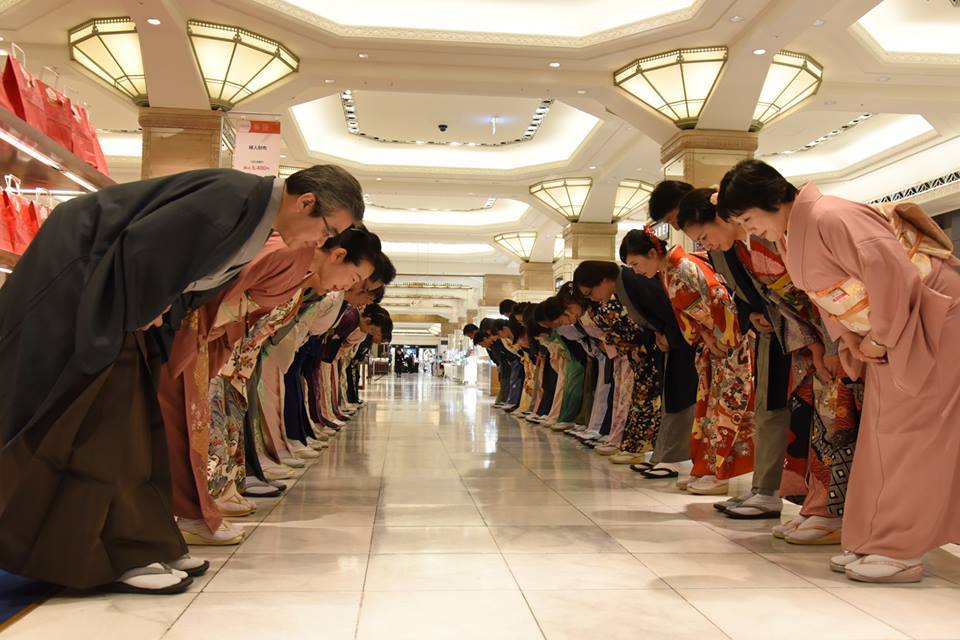Omotenashi spirit and TAIKYFOOD
Taky Food providing products and services to bring high quality food powder to customers. To do this, Taky Food and all employees always take Japanese Omotenashi Culture as a guideline in the process of operating and interacting with customers and society.

Recognizing this greatness, the Board of Directors and all employees of Taky Food have learned and applied this culture not only in the interaction with customers but also in the daily life of each Takier.
THE SPIRIT OF OMOTENASHI IS APPLIED BY TAKY FOOD ON 3 PRINCIPLES:
❁ Take care customer beyond their expectations.
This is the basic difference between the service (サ ー ビ ス) and Omotenashi. Waiters bring towels to guests or motel owners to prepare blankets for guests to relax as a service. But when the waiter handed a towel to the guest and said softly, "You must have worked hard!", Or when the landlady wrote a small piece of paper next to the mattress that was spread out to the guest with words. Message: "Good night!", or when entering the coffee shop staff give you coffee and smile and say: "Please enjoy slowly" ..., that's called Omotenashi.
These gestures of caring for customers, helping them feel so comfortable and pleasant are small but delicating, giving customers good feeling, great impression and pulling them back many times.
❁ Wholeheartedly serve customers without the guests having to "pay thanks" back.
In many countries around the world such as the United States and Australia, when being treated politely by a customer, guests often have to tip to the employee as a service charge paid to the receptionist. But in Japan, whether it is a luxurious place or an ordinary small shop, the staff are warmly greeting, thanking, serving without asking for anything else. The polite, courteous and courteous attitude that does not require the return of such guests is the Japanese Omotenashi.
❁ A warm welcome from a sincere heart, not a reluctance.
The Japanese believe that in order to be able to care, think of others, we need to have relaxation in the soul, the spirit similar to the notion that a cup of water can only be filled with water when the cup still empty. Therefore, in order to have peace in mind, Japanese people often come to meditation, read books or go to the paintings at Fine Art Museums, to have time to think, to help calm and sharpen their minds. Back to yourself.
In the era of internationalization, many different cultures and thoughts are introduced into Japan, they try to integrate but not to be dissolved, and on the contrary, they are trying to bring the proud beauty of Japanese culture expanded to the world.
Omotenashi and Taky Food
1. Customers understanding
Taky Food always sets the time each employee in different departments to interact with customers: senior managers need to spend at least 20% of the time schedule for customers, sales managers (40%), production management (30%), service management (20%), marketing management (25%) and technical departments (5%) ... This gives employees practical experience with customers in their field, understand customers properly.
2. Meet expectations
The highlight of Omotenashi's service spirit is always catching up and meet customer tastes. Therefore, during the operation, Taky Food strives to understand the interests, needs and create "unbelievable" products. That is the foundation for Taky and Takoky brands to launch a new packaging, striking with soft, delicate design, modern and luxurious image in 2019.
With small but subtle changes, consumers can easily see the spirit of serving Omotenashi imbued with each of Taky Food's creations. This change has gone in the direction of natural, origin following the trend of health eating, vegetarian, macrobiotic is increasingly prevalent and popular.
3. Communication with customer culture
- Dedication to customers, always giving customers the best products - services within the ability to allow; always demonstrate its commitment to providing the best products and services with stable quality in all business.
- Respect customers, make them feel important.
- Listen to customers' comments positively; Do not say “no” directly to customers. In the event that no agreement is reached, a clever rejection approach should be used.
- Building long-term relationships with customers, win-win relationship.
4. Handling complaint - feedback from customers
- Always listening to capture requirements of customers.
- Always show attitude of empathy and patience, gentle, friendly and polite; Do not be impatient to the customer requirements.
- Maintain a welcoming attitude with a smile or bright eyes, showing willingness to share with customers during conversations.
- Enthusiastic and try our best to solve customer requirements quickly and effectively.
- The volume of the voice is moderate, the expression must clear, do not make customers ask again.






